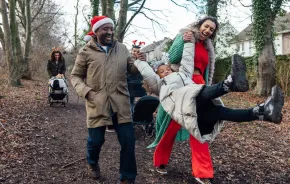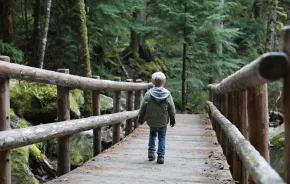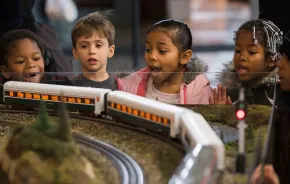 Editor's note: Get more ideas at our new family guide to volunteering!
Editor's note: Get more ideas at our new family guide to volunteering!
Several years ago, when Heather Smith’s son Benjamin was in kindergarten, she started looking around for opportunities for their family to volunteer together. After some searching, they signed up at Food Lifeline, a Shoreline-based food distribution agency. Food Lifeline holds weekly two-hour work parties during which volunteers as young as 6 years old help repackage bulk donations of food for delivery to food banks and shelters.
“What amazed me was that from the first time we volunteered, he loved it,” Smith says. Ben likes working alongside his parents and other volunteers to break down, say, a giant box of puffed-rice cereal and repackage it in family-size bags. He likes that he gets to measure out food and count out packages in a box. He likes seeing all the different foods and learning about the issues. And he likes doing work that’s needed in a place that isn’t his home. (It doesn’t hurt that a conveyor belt is involved.)
“Aside from the volunteering, it’s been such a source of joy for me how much he loves working,” Smith says. Three years later, she sees him connecting the dots on issues such as food and hunger, and their positive experience has sparked them to organize a regular volunteer group from Ben’s school at Food Lifeline.
“This activity provides us with the opportunity to grow and give together. Ultimately, we hope Ben will become a lifelong volunteer,” says Smith.
Smith’s story is an example of why so many families with younger kids try to carve out time for volunteering together. They value the chance to spend time together in service of a common purpose — with cell phones and iPads put to the side. They value the exposure to new people, places and issues, and shared, tangible work: packaging food, pulling weeds, planting seeds.
“There is a big demand for family-friendly volunteer opportunities,” says Erica Ellis, online volunteer specialist for United Way King County. “Parents want to introduce topics such as hunger and homelessness in a hands-on way, instead of just talking about it. They want to give back to the community while getting in good quality family time.”
Part of everyday life
Unfortunately, despite growing interest, finding kid-friendly opportunities isn’t always easy. “It can be challenging for nonprofits to take time to develop opportunities for young kids that are meaningful,” Ellis says, “but I think more will be doing that because there’s increased demand.”
One strategy is to start by looking around your neighborhood, seeing what the needs are — and connecting to the organizations that address them.
Whitney McBride, who lives in the North Delridge neighborhood of West Seattle with her husband, Matt, and two sons, Gabe and Eli, takes that tack naturally.
“We make volunteering part of our everyday life,” she says. For years, she has brought her two boys — now ages 4 and 8 — with her to pick up and drop off donations for WestSide Baby, a West Seattle nonprofit that provides essential items to local children in need.
Simple tasks like loading the car and driving to and fro give them an opportunity to discuss what they’re doing and why. “People hold off with volunteering with their kids,” she says. “But it’s amazing what just driving around can do.”
The boys also accompany her and her husband on local beach and park cleanups. The family recently participated in a work party at Lincoln Park in West Seattle. The project was managed by EarthCorps, a Seattle-based nonprofit that leads more than 200 environmental service projects a year, with a volunteer youth corps managing teams of community volunteers.
In addition to planting native plants and trees at a site in the park, McBride’s boys learned how to pull out English ivy, a widely invasive plant that’s fairly easy for little (and big) hands to uproot. Soon her 8-year-old had created a pile of ivy almost as tall as him. “He was so excited that he had done this with his own hands,” she says.
She appreciated how well EarthCorps staff integrated the kids into the experience, which concluded with a moment of reflection during which volunteers — kids and adults alike — shared what they’d learned: that salmonberries grow in Lincoln Park, how to spot noninvasive blackberries, and that lovely-looking English ivy is highly invasive.
 Finding the right match
Finding the right match
How can you find a match? Online resources geared specifically toward family volunteering are increasing. You can sort by youth-friendly opportunities at United Way King County’s comprehensive database, for example.
KidServe, founded by local mom Rachael Podolsky, is a newly redesigned online resource designed specifically to connect families to local volunteer opportunities. A number of nonprofits regularly list events on its site, including PCC, which holds food-repackaging events; Friends of the Cedar River Watershed, an environmental nonprofit that posts cleanup efforts; and Operation Sack Lunch, a nonprofit that uses volunteers to serve and prepare meals for homeless people.
And as with everything in life, you can also do it yourself. “A good reminder to families is that it doesn’t have to be a formal volunteer opportunity. There are many things you can do at home with kids, especially little kids, and tie it into a cause,” says United Way’s Ellis.
Ellis recommends a website called doinggoodtogether.org, which has a section on “kitchen-table projects,” tasks such as writing cards to veterans, or growing food in your home garden for a food bank.
The important thing is to get started. Whitney McBride has been amazed at the impact of initially small volunteer efforts over time. Her older son now volunteers at his school’s autism program and has started speaking up at community meetings — most recently, he gave a kid’s perspective on a park project that will involve redesigning a playground. Now, the whole family has become involved in the community-led project.
“This is what we see impacting him with volunteering,” she says. “He knows that you can get involved and make change. That if ‘I speak up and act, change can happen.’”
Elisa Murray, ParentMap’s Out + About editor, is still searching for volunteer opportunities that will make the best use of her son’s shouting and sorting skills.
Superhero families: 6 great ideas for giving back
1. Help restore a beach or park. It’s hard to beat the tangibility of planting trees, doing battle with invasive plants or cleaning up a beach. Opportunities abound, especially during Earth Month. Check for upcoming events at organizations such as EarthCorps, Mountains to Sound Greenway, Nature Consortium, Friends of the Cedar River Watershed and Tacoma Nature Center.
2. Build a trail. If your kids are comfortable with hiking, join a Washington Trails Association (WTA) work party to maintain trails in some of the most beautiful spots around Puget Sound; kids younger than 14 are welcome with an adult. You could even sign up for one of WTA’s week-long volunteer trail-building vacations.
3. Turn your car into a do-good-mobile — and your kids into your deputy do-gooders — by picking up and delivering donations for organizations like food banks, and organizations that serve families with babies and young children.
4. Bring joy to seniors. Call up that local nursing home that you’ve been driving by all those years and see if you can bring the kids for a visit (extra points for babies). If your family plays music together, you can put on a show. United Way’s Erica Ellis notes that Full Life Care (fulllifecare.org) is a good resource for such opportunities.
5. Sort baby clothes and toys. Children who are preschool age and older can practice their sorting skills by helping nonprofits like St. Joseph’s Baby Corner in Seattle, Eastside Baby Corner and Tacoma’s Toy Rescue Mission organize incoming donations of children’s clothes and material goods. In some cases, you can sort from home.
6. Organize food. Kids and parents can work together to help nonprofits like Food Lifeline, the PCC Food Bank Program and Pierce County’s Food Connection repackage bulk food for local food banks and shelters. Perks include getting to watch trucks and conveyor belts in action, and the chance to practice counting skills as you work.
Want more? See our new, comprehensive family volunteering guide!
Family volunteering websites
Doing Good Together
Generation On
KidsServe
The Volunteering Family
Volunteer Match
United Way King County
United Way of Pierce County
Photography credits: EarthCorps










